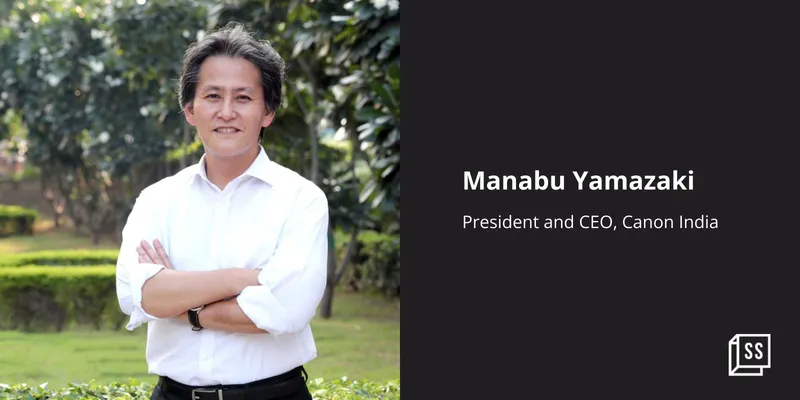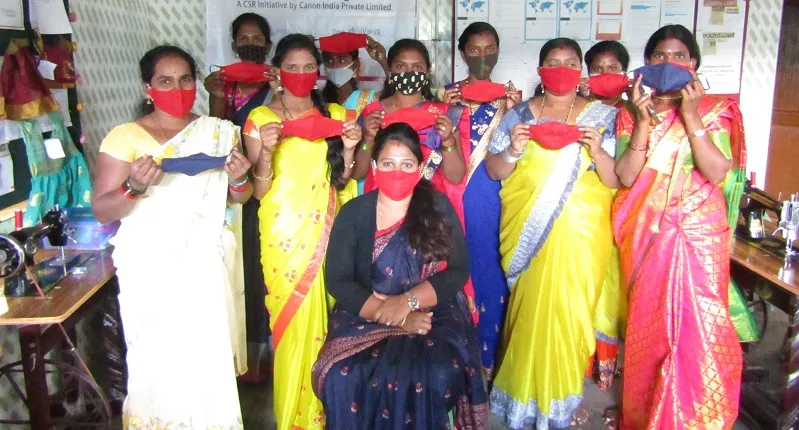Canon India empowers rural communities with its ‘Four Es’ sustainable development
In a conversation with SocialStory, Manabu Yamazaki, President and CEO of Canon India, talks about the Adopt a Village initiative that helps with the sustainable development of village communities.
For a Class 2 student, Rakhi —who resides in Maheshwari in Haryana—learning at school came to a standstill amid the COVID-19 pandemic.
When the school reopened last year, the nine-year-old got promoted to Class 3. Since she could not read Hindi, the teachers put her in a remedial class, where she learnt to read and write the language. At present, she is interested in pursuing computer studies.
This, however, was a joint effort by Rakhi and her teachers, with intervention from Canon India — a professional and consumer imaging equipment and information systems company.
Under its ‘Adopt a Village’ initiative, Canon India has been organising various programmes in rural India for over nine years, positively impacting 80,000 people across the country.
From installing solar street lights to opening a resource centre — Rakhi’s village has grown into a model example of rural development. Its transformation story is one among many.

“Companies, as public entities within society, are expected to contribute to the creation of a better society through sound and fair business activities,” believes Manabu Yamazaki, President and CEO of Canon India.
He tells SocialStory, “We believe organisations should focus not only on the economic well-being of the nation where they operate but also upon its social fabric. Every initiative we undertake is aided by active employee engagement.”
The Adopt a Village initiative, launched in 2012, shoulders the overall development of its adopted villages for five years. Besides Maheshwari, Canon India has adopted three other villages — Annadodi in Bengaluru, Kalyanpur in Kolkata, and Parivali in Thane.
Ronnie and Zarina Screwvala are transforming rural India with Dream Village initiative
The Four Es
Canon India’s Adopt a Village project focuses on its Four Es CSR policy — Education, Eye Care, Empowerment, and Environment. “It also forms the basic requirements of sustainable living,” Manabu shares.
Focusing majorly on education, the programme has established a resource centre and an e-learning facility and helps schools with an overall improvement of their infrastructure across its adopted villages.
At its resource centres, teachers conduct remedial classes by going door to door to teach students through tablets provided by Canon India.
It also emphasises improving student enrolment and retention figures. In the last five years, Canon India has been instrumental in adding a total of 1,235 children to schools in its adopted villages.
For eye care, Canon has set up a vision centre in its adopted villages, where the community can get their eyes tested by specialists.
It conducts regular free eye check-up camps for the students and community and identifies and refers patients with cataracts and other ailments to nearby government hospitals for further treatment. To date, it has offered over 5,342 patients with free eye check-ups.

Manabu Yamazaki engaging with a girl from Maheshwari Village.
The initiative has installed solar panels in the village schools for a continuous supply of electricity and solar street lights to ensure appropriate lighting after sunset. Over the last five years, it has installed 38 solar street lights and 10KW of solar panels in the village.
Its ambitious projects—the introduction of groundwater recharge and rainwater harvesting projects—help improve groundwater levels in school premises. Its other sustainability projects include cleanliness, tree plantation drives, and adding kitchen gardens in village households.
It has planted 685 trees across the village, along with establishing 71 kitchen gardens.
Moreover, to empower the community, Canon has set up vocational training centres to provide youth with career opportunities.
“Beyond Adopt a Village, we are also associated with SOS Children’s Villages of India to support the education and overall development of children in these villages under an exclusive initiative ‘Support a Life’,” Manabu shares.
The initiative is a joint effort by Canon India and its employees, where it contributes an equal sum donated by its employees for child adoption. “In 2021, 218 employees came forward to adopt 252 children from SOS Children’s Villages of India,” he says.
“Through our community-driven CSR initiatives, we have touched over 156,849 lives since 2015, with the active involvement of over 16,024 volunteers,” Manabu proudly shares.
Empowering women
Amid the pandemic, Canon started a special initiative to enable women to become financially independent and support their families.
Early this year, the company organises mask-making workshops for the women of Annadodi village near Bengaluru. The first batch consists of 15 women, who have made 5,000 masks in three months.

From the mask-making initiative
In line with the vision of creating women entrepreneurs, Canon will buy these masks and distribute them to students and teachers across its adopted villages.
“We are going from strength to strength through initiatives that empower women and young girls to become self-aware and reliant and enable a sustainable source of livelihood for themselves,” Manabu says.
For this, Canon is planning an interactive session with two ex-students of its vocational centre—now working in a post office and a hospital, respectively—for the women of Maheshwari village.
It aims to highlight the importance of woman empowerment and have the much-needed dialogue to break the bias and obstacles faced by women to become self-reliant. The session will also include a segment on menstrual health, focusing on creating awareness among women and young girls.
“We are conducting vocational training activities, specially curated for women, in line with their current economic requirements. Besides creating awareness on relevant social issues, we provide various technical skills, including stitching and beautician courses, encouraging them to tread on the path of entrepreneurship and become financially independent,” he explains.
One faces umpteen number of challenges when they are bringing about grassroots-level changes in society. For Canon, it was the realisation that it takes time to create measurable impact.
Initially, when Canon adopted the villages, it thought of implementing certain activities the children and community would adapt. However, it took time to make them understand the benefits of the initiatives. It did so by undertaking regular awareness sessions and making them active participants in its development projects.
“We realised that any development is not a year’s task. It takes time to bring change,” Manabu says as the company now looks forward to contributing towards global change and development despite any hindrance.
Edited by Suman Singh






